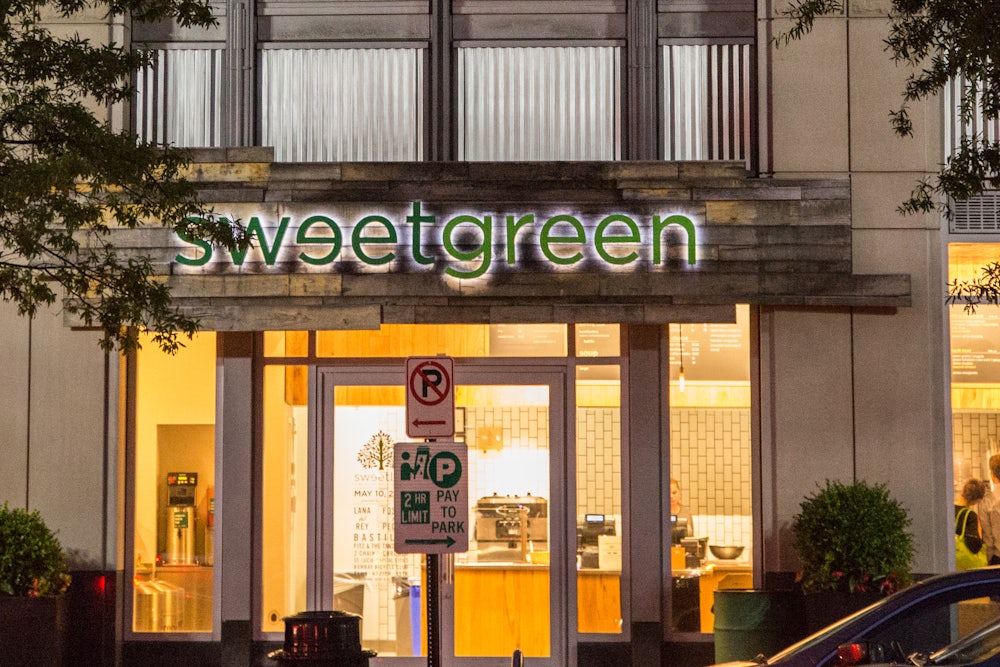Sweetgreen, as you may already know, sells expensive salads. Its schtick is fairly simple: Take lettuce and kale, put it in a bowl with some other stuff—maybe chicken, maybe tofu, maybe cranberries—and then charge $15. The company also brands itself as a more ethical consumption choice than its salad competitors with nonminimalist aesthetics. For Sweetgreen, this combination has led to the company being valued at $1.6 billion—not the same thing as actually having that imaginary cash to spend—and now, its three Georgetown bro founders are incredibly wealthy and get to do things like drop $22 million on a house in Los Angeles. I assume this is what people mean when they talk about green capitalism.
On Monday, Quartz ran a piece on a Sweetgreen program called the Family Fund, an intracompany system through which Sweetgreen’s white-collar, higher-salaried workers are given the option of contributing a portion of their salary to an account that selectively provides financial support for its 3,000 behind-the-counter workers—who make, on average, between $13 and $15 an hour, according to Indeed. This money is specifically for employees who are going through a “life-altering event,” and all requests are reviewed by a committee of four Sweetgreen employees. (And yes, of course, these donations are tax deductible.)
The program, which has existed for about three years now, grew out of a medical crisis for one of Sweetgreen’s assistant general managers. After she underwent emergency surgery, her co-workers raised money to help cover her medical bills, “and the corporate office agreed to match the donations,” according to Quartz. The Family Fund that grew out of the effort is largely identical to the crisis crowdfunding model that you’ve maybe seen making the human-interest rounds—except permanent.
On an individual level, a story about a person being suddenly able to afford a plane ticket for a final visit with a loved one or pay for a life-saving surgery can be uplifting, because that’s the natural reaction to seeing people help each other. It’s why media outlets looking for easy viral hits and television shows like Good Morning America constantly pull from this bag. But when one strings dozens of these stories together—especially in the case of Sweetgreen, when the money is coming from better-paid corporate employees instead of wages from the company itself—the imbalanced reliance on these systems suddenly transforms into a mosaic of capitalism’s daily violences.
“It was really an emphasis on trying to better take care of people, especially our team members in restaurants,” Sweetgreen co-CEO and co-founder Nathaniel Ru told Quartz. (When asked, Ru refused to provide statistics on how many employees paid into the program or offer comment on the larger structural conditions that would leave someone in need of colleagues’ fundraising for her medical bills.) Still, this model is all very inspiring to a very specific subset of investor types and self-billed entrepreneurs.
Ultimately, the Family Fund is a branding exercise. Its existence allows Sweetgreen’s customer base of mostly wealthy city-dwellers to cling to the illusion that they are extending their liberal values in choosing their lunch, that their consumption habits signal they are doing The Right Thing. To do anything more, like hold the company’s feet to the fire about raising the wage floor, would require an active disruption of this exercise. As noted by Quartz reporter Sarah Todd, “some might argue that the company should reevaluate its pay structure rather than asking its white-collar workers to make up the difference.”
Is Sweetgreen’s product on the destructive level of McDonald’s? Are their owners as repulsive as Papa John’s? No—but is that really the bar you want to set for yourself?
It’s the kind of setup one could only expect from this stage of capitalism: In a country replete with food deserts, three private-school alums bonked their noggins together and started a business based on selling salads with slick branding, and are now so successful that they can do things like pay Kendrick Lamar to play a salad-funded music festival where they sell things like a “Beets Don’t Kale My Vibe” salad. And like most people who strike gold, they seem keen on not releasing their grip on their profit margins to the extent that it prevents them from doing things like owning apartments in three major cities and curating all of them with designer sofas and high-priced original art. Annual rent on just one of those apartments could probably pay off more than a few emergency surgeries. So could across-the-board wage increases.
